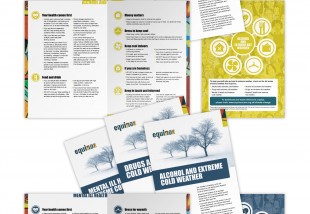Articles
Equinox extreme weather guides – alcohol, drugs and mental ill health
Tweet
How should I prepare for and respond to extreme weather? It’s often not the first priority for many people to consider this question – let alone people who have more immediate personal concerns such as health problems or challenging lifestyles. Perhaps that’s why there was such a lack of extreme weather advice tailored for people who suffer with mental ill health, drug dependence and alcohol dependence.
To address this advice gap, last year the Department for Environment, Food and Rural Affairs (Defra) funded Equinox to produce six extreme weather guides for extreme cold and hot weather. The guides were to target people who use drugs and alcohol, and people who suffer mental ill health.
Equinox service users were asked to lead a 6 month research and development process. They came together in a series of forums to discuss how extreme cold and hot weather affected them and what would be useful information to collect and present in the guides. Service users agreed that it was an important project for all of them, because when they had been mentally unwell, or had used drugs or alcohol to mood-altering levels, they had all been caught out by extreme weather. They had all suffered consequences such as: isolating alone for days at a time; being caught without enough money to buy food or suitable clothing; slipping over on ice; drinking or taking more drugs to ‘cope’ with freezing weather; staying out too long in hot sunshine and suffering headaches or disorientation; feeling too cold to get out of bed; missing vital medication or appointments, and in extreme cases, becoming very distressed and unwell to the point they needed urgent medical help. Extreme weather was a very real problem, people discovered, in their current lives.
So Equinox service users put their minds to creating a set of practical tips that could help other people in extreme hot and cold weather. Soon, there were lots of good ideas that people suggested from their own experience, about how people could take care of themselves. Topics proposed for the guides were: health; food and drink; money; clothing; keeping warm or cool indoors; essential tips for homeless people; keeping informed and in touch. Expert guidance on health matters was provided by our medical professionals.
The most important discovery of the project was that no-one on the Equinox research team had ever proactively prepared for extreme hot or cold weather. It took several sessions at the start of the research process for people to understand fully how this project related to their most pressing needs in their daily lives. Upon reflection, however, Equinox service users soon realised that they had all experienced negative effects of extreme hot or cold weather – and they had also developed some clever adaptive responses, which they were keen to share with others. There was a real sense of pride about being able to pass on strategies they’d devised for themselves, to help other people.
Another key learning was that the 1-2-1 sessions for service users with complex mental health needs were much more productive than forums. They allowed those service users to talk freely about how extreme weather had affected their lives, where they proposed some creative, simple and affordable ideas. One Equinox service user who has a diagnosis of schizophrenia spoke about how he had adapted to really cold days by taking his clothes into the bathroom with him in the morning, so he could take a hot shower, dry off completely in the bathroom, then get dressed in the warmth created by the shower steam – it helped him to feel better in the cold weather, he said. Another service user who had been homeless spoke about how in extreme heat, he suffered badly with foot infections, so he had learnt to wash his feet much more regularly. These simple things made a big difference.
Equinox are now distributing the climate change series to external agencies and electronic guides are available as free downloads on the Equinox website.
Charlotte Tarrant is Marketing Manager for Equinox, the charity that provides support, care and recovery to people who are challenged by exclusion, marginalisation and a range of needs for special assistance such as mental health problems and substance misuse.
Leave a Reply